
Muhammad Anwar es-Sadat was an Egyptian politician and military officer who served as the third president of Egypt, from 15 October 1970 until his assassination by fundamentalist army officers on 6 October 1981. Sadat was a senior member of the Free Officers who overthrew King Farouk I in the Egyptian Revolution of 1952, and a close confidant of President Gamal Abdel Nasser, under whom he served as vice president twice and whom he succeeded as president in 1970. In 1978, Sadat and Menachem Begin, Prime Minister of Israel, signed a peace treaty in cooperation with United States President Jimmy Carter, for which they were recognized with the Nobel Peace Prize.

The Camp David Accords were a pair of political agreements signed by Egyptian president Anwar Sadat and Israeli prime minister Menachem Begin on 17 September 1978, following twelve days of secret negotiations at Camp David, the country retreat of the president of the United States in Maryland. The two framework agreements were signed at the White House and were witnessed by President Jimmy Carter. The second of these frameworks led directly to the 1979 Egypt–Israel peace treaty. Due to the agreement, Sadat and Begin received the shared 1978 Nobel Peace Prize. The first framework, which dealt with the Palestinian territories, was written without participation of the Palestinians and was condemned by the United Nations.

The New Wafd Party, officially the Egyptian Wafd Party and also known as the Al-Wafd Party, is a nationalist liberal party in Egypt.

The National Democratic Party, often referred to in Egypt as simply the National Party, was the ruling political party in Egypt from 1978 to 2011. It was founded by President Anwar Sadat in 1978. The NDP wielded uncontested power in state politics, usually considered a de facto single party, with authoritarian characteristics, inside an officially multi-party system, from its creation until the resignation of Sadat's successor Hosni Mubarak in response to the Egyptian Revolution of 2011.

The Egypt Arab Socialist Party was a political party in Egypt.
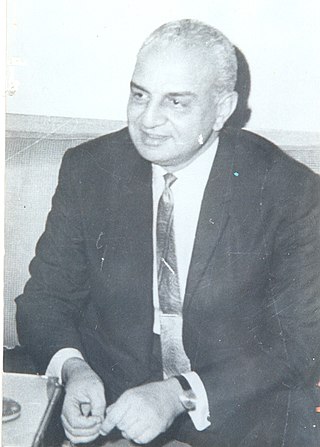
Mamdouh Mohamed Salem was the 39th Prime Minister of Egypt from April 16, 1975 to October 2, 1978.
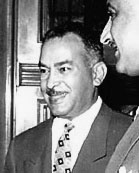
Ali Sabri was an Egyptian politician of Turkish origin.

Muhammad Abd Al-Halim Abu-Ghazala was Defense Minister of Egypt from 1981 to 1989. Abu Ghazala was seated next to Anwar Sadat when the president was assassinated.
Events in the year 1977 in Israel.
Early parliamentary elections were held in Egypt on 7 June 1979, with a second round for 147 seats being held on 14 June. Following the experimental 1976 elections, in which three different factions of the Arab Socialist Union had competed against each other, the country had returned to multi-party politics. This was confirmed in a referendum on the formation of new parties held in April. The elections were the first multi-party elections since the 1950 parliamentary election, three years before the country became a republic.

Presidential elections were held in the United Arab Republic on 15 October 1970, following the death of the incumbent Gamal Abdel Nasser on 28 September of the same year. The election took the form of a referendum on the candidacy of vice president and acting president Anwar El Sadat. According to the official results, 90% of voters voted in favor of Sadat, with a turnout of 85%.
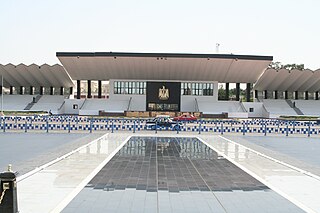
On 6 October 1981, Field Marshal Anwar Sadat, the 3rd President of Egypt, was assassinated during the annual victory parade held in Cairo to celebrate Operation Badr, during which the Egyptian Army had crossed the Suez Canal and taken back the Sinai Peninsula from Israel at the beginning of the Yom Kippur War. The assassination was undertaken by members of the Egyptian Islamic Jihad. Although the motive has been debated, Sadat's assassination likely stemmed from Islamists who opposed Sadat's peace initiative with Israel and the United States relating to the Camp David Accords.
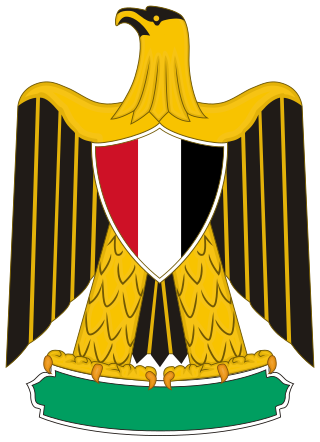
The Arab Socialist Union was an Egyptian political party based on the principles of Nasserism and Arab socialism. It evolved during the years of Sadat to become the National Democratic Party, which ruled Egypt until the 2011 revolution.
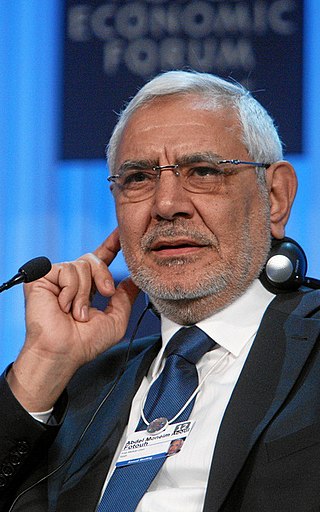
Dr. Abdel Moneim Aboul Fotouh Abdel Hady is an Egyptian physician, former student activist and a politician. In 2011–2012, he ran for President of Egypt as an independent. He was formerly a leader of the Muslim Brotherhood.

The history of Egypt under Anwar Sadat covers the eleven year period of Egyptian history from Anwar Sadat's election as President of Egypt on 15 October 1970, following the death of President Gamal Abdel Nasser, to Sadat's assassination by Islamist fundamentalist army officers on 6 October 1981. Though presenting himself as a Nasserist during his predecessor's lifetime, upon becoming president, Sadat broke with many of the core tenets of the domestic and foreign policy ideology that had defined Egyptian politics since the Egyptian Revolution of 1952. In addition to abandoning many of Nasser's economic and political principles via the Infitah policy, Sadat ended Egypt's strategic partnership with the Soviet Union in favor of a new strategic relationship with the United States, initiated the peace process with the State of Israel in exchange for the evacuation of all Israeli military forces and settlers from Egyptian territory, and instituted a form of politics in Egypt that, whilst far removed from Egypt's pre-revolution democratic system, allowed for some multi-party representation in Egyptian politics. Sadat's tenure also witnessed a rise in governmental corruption, and a widening of the gulf between rich and poor, both of which would become hallmarks of the presidency of his successor, Hosni Mubarak.

The Reform and Development Party is a liberal political party in Egypt.
The National Party of Egypt is an Egyptian political party made up of former members of the NDP.

The corrective revolution was a reform program launched on 15 May 1971 by President Anwar Sadat. It involved purging Nasserist members of the government and security forces, often considered pro-Soviet and left-wing, and drumming up popular support by presenting the takeover as a continuation of the Egyptian Revolution of 1952, while at the same time radically changing track on issues of foreign policy, economy, and ideology. This includes a large shift in Egyptian diplomacy, building ties to the United States and Israel, while breaking from the USSR and, after signing the Egyptian–Israeli Peace Treaty, Egypt's subsequent suspension from the Arab League.

Mohamed Anwar Esmat Sadat is an Egyptian politician. He was a member of the Egyptian Parliament during the rule of Hosni Mubarak. He is related to two prominent Egyptian politicians, as the nephew of Anwar Sadat and brother of Talaat Sadat. He won a seat during the 2011–12 Egyptian parliamentary election for the second constituency (Fardi) Monufia Governorate and is the founder of the Reform and Development Party along with Raymond Lakah.
Kafr Zurqan is a village in the Tala Markaz in Monufia Governorate in Egypt. It is located next to the village of Mit Abu El Kom, where former President Anwar Sadat was born. It is affiliated to the local unit in Mit Abu al-Kom.

















